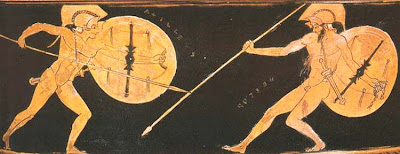Or perhaps I should say, "attached to caffeine."
I've been thinking about the connection between Buddhism and tea, or caffeine. It goes way back. All the way back, it seems (i.e. according to Alan Watts and many web-sources which may all be pointing back to Watts, for all I can tell), to Bodhidharma, the monk from India who brought Buddhism to China.

Bodhidharma is traditionally portrayed with brooding seriousness, but without eyelids. According to legend, he spent nine years staring at the wall of a cave, intent on piercing his way through to enlightenment. At one point, frustrated that his tired eyes kept closing, he tore off his eyelids and tossed them to the ground. They sprouted into tea bushes. What he saw as the problem became the solution for his drowsiness.
The solution was caffeine.
I wonder how this fits in with the Five Precepts, in particular with the fifth precept, which translated from Pali reads: "I undertake the training rule to abstain from fermented drink that causes heedlessness." In Thay's tradition, the fifth "mindfulness training" expands the rule to avoiding the consumption of anything that contains "toxins," from alcohol and drugs to certain movies and conversations. This training has been very helpful for me, supporting me for instance in my decision to skip much of the current cinema, which I consider too violent, and current television, which I find completely vapid. I summarize the training for myself as avoiding the consumption of things that cloud the mind, one way or another. My aim is clarity of mind.
It just bothers me that in the morning, I don't have much clarity of mind before I have my tea. It used to be coffee -- over the years, I've cut back from two strong cups of coffee, to one cup, to three cups of black tea, to two, and now just one. I'm down to one cup of tea in order to combat anxiety and sleeplessness. But the idea of leaving behind that one cup makes me pretty unhappy. PLEEEEZE don't make me give up caffeine entirely!
(No, green tea in the morning just won't cut it. And don't even mention decaf. The pleasure is in the taste AND the kick together, don't you see?)
I think that I am a little attached (okay, addicted) to caffeine. And yet I feel justified in holding on to it, because caffeine seems to hold a sanctioned, if not sanctified, position in Buddhist practice. I've many times seen mention, in the American Buddhist magazines, of bringing oneself right to the cushion in the morning, after rising and making oneself a cup of coffee. I know that coffee is a daily ritual for many members of my sangha. I have heard that at least one monastic in our tradition starts the day with a cup of coffee, and another with tea. And there is the whole Zen tea ceremony thing.
Thay even has a gatha for drinking tea:
This cup of tea in my two hands -
Mindfulness held uprightly!
My mind and body dwell
in the very here and now.
But I suspect he is speaking of green or white tea, not strong English Breakfast tea, dark enough to need milk.
At least I try to be mindful as I make the tea, try to enact the ritual as just that, a sort of ceremony for starting the day, and not as merely a set of actions I find myself doing yet again, wishing someone else had already cleaned out the tea ball. Maybe mindfulness makes the attachment part okay. Or, at least makes it part of the path. But I don't think that awareness of attachment is the goal of the path. Mindfulness of addiction is not what the Buddha meant by freedom. Just being aware of an attachment is not enough to free yourself of the suffering caused by the attachment. Especially if you don't really want to free yourself of the suffering caused by the attachment.
Well, I do want to be free of the suffering (the pre-tea grumpiness, the headache). I just don't want to be free of the cause of the suffering. Because I really like my one cup of caffeine ... er, tea.
I'm reminded of a story I heard the year I attended Quaker meeting. William Penn, governor of Pennsylvania, had befriended George Fox, the founder of the Society of Friends, and had just become "convinced" -- that is, converted. Quakers, of course, were committed to plain dress and non-violence, in contrast to Penn, who, as befitted his rank and station, dressed finely and carried a ceremonial sword. Penn was loathe to give up his sword. He asked Fox what to do, and Fox answered, "Wear it as long as thee can, William."

As for my tea?
"Drink it as long as thee can, Lauren."
It's all part of the path, right?
(Please stop glaring at me, Mr. B.)







